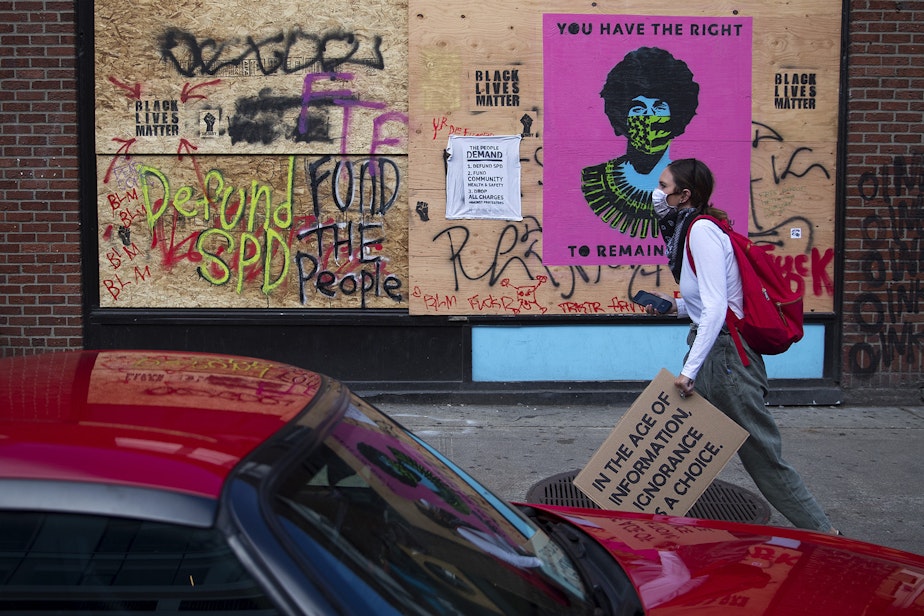Protesters fill City Hall amid calls to cut Seattle Police funding in half

Seattle City Council member Kshama Sawant on Tuesday evening held a rally at Cal Anderson Park, before leading protesters in a march to City Hall for an impromptu community forum.
Advocates reiterated growing calls for the city to cut funding for the Seattle Police Department and for Mayor Jenny Durkan to step down.
Protesters on Tuesday emphasized three key demands that have been set forth by Black-led community organizations:
- Cut funding for the Seattle Police Department by at least 50%;
- Dedicate more of the city's resources to health and social services;
- Release any protesters in custody without filing charges.
The Seattle police budget for this year is approximately $409 million, which accounts for just over a quarter of the city's general fund budget.
Advocates say they want to see half of that money — and then some — redirected toward homelessness programs, mental health services, and prioritizing the needs of Black and brown communities.
READ: Why 'defund the police' has become the rallying cry at Seattle protests
Many have also demanded that the Seattle Police Officers Guild be ousted from the King County Labor Council, which represents more than 150 unions and over 100,000 workers. Advocates for the change have pointed to a culture of American police unions interfering with investigations into police misconduct.
"At this point, where we are in this day and time, we can no longer afford for [police] to go through more trainings ... more apologies," said one speaker. "Thank you, but no thank you. Get the hell out of the union and earn your way back in if you need to."
Sawant, a member of the Socialist Alternative party who represents central Seattle neighborhoods, called the Seattle Police Department's decision to stand down the night prior during a protest at the East Precinct "a victory."
"We must not underestimate what has happened here," Sawant said to a crowd of thousands gathered at Cal Anderson Park as her voice cracked. She had been among protesters who were tear gassed during demonstrations held over the weekend.
"The East Precinct is not just any precinct — it was the flagship of the Seattle Police Department. And it has now been taken away from them," she said.
The area surrounding the East Precinct has been dubbed the "Capitol Hill Autonomous Zone" or CHAZ by protesters in the wake of police removing a barricade that was previously there. Activists have called for the precinct to be converted into a restorative justice community center.
The East Precinct had become a stage of contention between demonstrators and officers, who have repeatedly deployed tear gas, pepper spray, and flashbang grenades against demonstrators in the area near 11th Avenue and East Pine Street.
READ: 'They've given us the precinct.' Seattle Police backs away, and protesters take back Pine
Seattle Police Chief Carmen Best said last Friday that the department would no longer use tear gas on protesters. But by Sunday, officers had deployed it yet again on demonstrators in Capitol Hill.
Black Lives Matter Seattle-King County and the American Civil Liberties Union of Washington on Tuesday announced they'd filed a lawsuit against the city and police department for using chemical irritants and weapons against protesters. They called the actions an "excessive use of force."
Sawant said she is drafting legislation that would ban police from using chemical weapons like tear gas, and outlaw the use of chokeholds to subdue people being taken into custody. She also pledged to bring forth legislation to cut funding for the Seattle Police Department "very soon."
Those proposals are slated to be introduced on Monday, June 15.
During Tuesday's rally, Sawant cited numerous police killings by the Seattle police officers since 2011, and pointed to the lack of prosecution occurring in any of those cases.
One such case centers Charleena Lyles, a Black woman fatally shot by two white Seattle police officers in front of her children in 2017. Lyles, 30, was pregnant with her fifth child at the time of her death.
The Seattle Police Department's Force Review Board in 2017 determined that officers Jason Anderson and Steven McNew had acted in alignment with department policy when they shot Lyles seven times in her apartment.
The officers said that Lyles, who had a history of mental illness, attempted to stab them with a knife as they responded her 911 call about an alleged burglary.
A King County Superior Court judge in 2019 dismissed a wrongful death lawsuit brought against Anderson, McNew, and the city by Lyles' family.
Lyles' cousin, Katrina Johnson, took the podium at Cal Anderson during Tuesday's rally to demand Durkan's resignation and an apology for how the case has been handled.
"She promised my family before she took office, that she would be there for us, that she would be accountable to us, and that she would hold officers and other folks accountable," Johnson said. "And none of that's happened."
Sawant echoed Johnson's call for Durkan to step down, and said she would introduce articles of impeachment against Durkan if she didn't resign of her own accord. Sawant also expressed a desire for the city to create community-based oversight board "with full powers over the police."
"And when I say full powers, I mean hiring and firing decisions," she said. "I mean subpoena powers. I mean an independent body elected by us by voters — not appointed by establishment politicians."
Sawant on Tuesday also emphasized her aim to see the city impose a "head tax," or per-employee fee on big businesses like Amazon. This, she said, could also help fund the city's social programs.
Casey Martin contributed reporting to this story.

